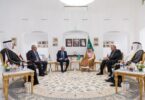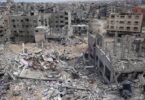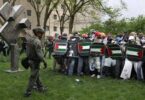Tatiana Stanovaya
Annoying for the authorities will be any unauthorized influence on a significant number of Russians – through posts, songs, articles or interviews. On a smaller scale, this is already happening today, but in the event of further escalation, the process will become massive, routine and erratic.
Two months after Vladimir Putin demanded from the Ministry of Foreign Affairs “to seek to provide Russia with serious long-term guarantees to ensure our security,” it becomes obvious that there will be no noticeable success in this direction. Having promised a military-technical response in case the talks fail, Russia is defiantly building up its military forces around Ukraine. Today, the number of those who believe in the reality of the military scenario is growing, which forces us to prepare for the worst.
For Russia’s domestic policy, the consequences of a possible military conflict will be no less significant than for foreign policy. A new round of confrontation with the West could dramatically accelerate the conservative and repressive tendencies that have been observed recently.
Habitat
Russia’s internal destabilization is often expected from a new round of confrontation with the West. Rising military spending and tougher sanctions will create an additional burden on public finances and worsen the socio-economic situation, making it more difficult for the Russian authorities to keep the situation in the country under control. Further, according to this logic, the growth of the protest potential, the radicalization of the systemic opposition, the deepening of contradictions within the ruling elite, etc. may follow.
All this indeed looks logical, but today there is much more reason to expect that events will develop in the opposite way. In the event of further escalation, the Russian authorities will not lose, but, on the contrary, will strengthen control over what is happening in the country. Moreover, unlike in 2014, when such an increase was accompanied by public euphoria, this time it will be reduced to coercion and suppression.
Several powerful factors are at work in favor of the repressive scenario. First of all, this is the growing dominance of the conservative, anti-liberal and anti-Western elite, including the security forces, in the decision-making process and shaping the agenda of the Russian authorities. The security forces are pushing out not only civilian curators of domestic politics, but also diplomats who are forced to switch to power rhetoric and adapt to the hawkish style of the Russian government, which has embarked on the path of a conscious and demonstrative escalation.
For this part of the ruling elite, the disruption of negotiations with the West, the deepening of confrontation, the tightening of sanctions are comfortable conditions that not only do not threaten their positions, but also significantly expand their opportunities in the struggle for new powers. In such a picture of the world, the worst American sanctions are only a matter of time, they will be introduced sooner or later, regardless of how Russia acts. So delay is just a waste of time.
Domestically, a new round of escalation will solidify the logic of a state of emergency, where the law can be ignored, where the end justifies the means, where there is no longer room for compromise and bargaining with internal opponents. Moreover, the aggravation of the confrontation distracts the president to the geopolitical agenda, which means that the security forces can get more powers inside Russia, more freedom of maneuver, including in choosing means to suppress “non-systemic behavior.”
War inevitably means increased isolation and control over the media, the Internet , the exclusion of foreign IT companies, and more stringent administration of the party field. It can be assumed that if the recent Duma elections coincided with the current aggravation around Ukraine, then no “New People” would have found a place in the Duma. Experiments are unacceptable in emergency conditions.
An increase in repressions will be practically inevitable, and not so much against the “oppositionists” (there are almost none left), but against cultural figures, bloggers, civil non-political activists, journalists, experts, etc. Annoying for the authorities will be any unauthorized influence on a significant number of Russians – through posts, songs, articles or interviews. On a smaller scale, this is already happening today, but in the event of further escalation, the process will become massive, routine and erratic.
Economy
There will be no one to seriously object to such a development of events because of the timidity of the non-power elites. The Moscow Times eloquently described the mood among the business community – despite the expectations of an imminent financial and economic shock, no one is ready to publicly question the decisions of the Russian leadership. And this is understandable: the best strategy for survival is to remain inconspicuous and not provoke doubts about your loyalty.
In the event of a serious escalation of confrontation, part of the non-power elite will choose to emigrate, while the rest will be forced to adapt to a new reality – the growth of domestic political risks, further erosion of property rights, devaluation of the courts, and more aggressive intervention by the security forces.
The state, faced with new financial difficulties, will inevitably increase tax pressure on business. The risks of limiting ownership and threats to foreign investors will grow. One of the latest FAS initiatives provides for the possibility of withdrawing shares of strategic enterprises. This is a clear signal that the position of foreign business in Russia is becoming even more fragile.
The Russian leadership is unlikely to see problems in such steps in the field of economic policy, because they live with a strong feeling that there is enough money in the country. Unlike Medvedev in 2016 with his famous “there is no money, but you hold on,” today the Ministry of Finance directly declares that “there is a lot of money in Russia.”
In 2021, the volume of Russia’s international reserves broke a historical record. However, the point is not even in objective indicators, but in subjective feelings – President Putin’s speeches on the financial and economic situation in Russia sound quite optimistic, creating the feeling that the country can afford a lot.
Previous years have shown that the Kremlin is willing to occasionally make opportunistic social spending in order to dampen social irritation and create more comfortable conditions for political change – this was the case in 2020 for the constitutional referendum and in 2021 on the eve of the Duma elections. The authorities are ready to invest in socially vulnerable groups in order to maintain a minimum level of public loyalty.
Politics
The entire policy of recent years, especially after 2020, was aimed at suppressing not only non-systemic, but also systemic opposition. Relations with the Communist Party are becoming more conflicted, pressure on the radical part of the party is growing. And the international escalation will make the Kremlin even more uncompromising, aimed at the complete neutralization of the communists.
Control over the elections will also grow, which will finally turn into plebiscitary campaigns at all levels with such a set of participants that the Kremlin will be satisfied with the victory of any candidate. It will be administration in its purest form, driving Russian society into a deep political depression with a sense of doom.
The tightening of control will inevitably affect other spheres of public life. Talk about “traditional values” will develop into spiritual and moral campaigns in various fields, affecting employment and career growth, the possibility of obtaining an education, developing contacts with foreign colleagues, and being active in social networks.
Many were surprised by the recent initiative of the Ministry of Culture, which published for public discussion a draft presidential decree “Fundamentals of State Policy for the Preservation and Strengthening of Traditional Russian Spiritual and Moral Values.” What today seems peripheral obscurantism, tomorrow may become everyday.
A new round of international escalation will sharply accelerate the repressive tendencies that have dominated Russian public life in recent years. Discontent will be suppressed with a vengeance, including in the ranks of systemic political forces, if there are those who are not ready to come under the full control of the curators of domestic politics. The curators themselves can also be subjected to a noticeable rotation, the result of which will be the strengthening of the role of the power bloc in domestic political affairs.
In the social sphere, we can expect a new round of jingoistic mobilization, but instead of natural consolidation, we will see a forced combat approach with ostentatious loyalty. Under such conditions, the divergence between the fake, marching system and the depressed, gloomy Russia will become an abyss with all the ensuing risks.
Courtesy: (carnegie.ru)






